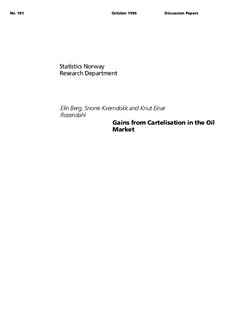| dc.contributor.author | Berg, Elin | |
| dc.contributor.author | Kverndokk, Snorre | |
| dc.contributor.author | Rosendahl, Knut Einar | |
| dc.date.accessioned | 2012-02-12T23:07:37Z | |
| dc.date.available | 2012-02-12T23:07:37Z | |
| dc.date.issued | 1996 | |
| dc.identifier.issn | 1892-753x | |
| dc.identifier.uri | http://hdl.handle.net/11250/180877 | |
| dc.description.abstract | In this paper we ask whether OPEC still gains from cartelisation in the oil market despite low producer prices and a modest market share. We apply two intertemporal equilibrium models of the global oil market; one consisting of a cartel and a fringe, and one describing a hypothetical competitive market. Comparing the outcome of these models we conclude that there are positive cartelisation gains of about 18 per cent in the oil market. In comparison with what Pindyck (1978) found for the 1970s this may be considered as quite modest. Moreover, we study whether the cartelisation gains to OPEC are altered by different moves by non-OPEC producers or consumer countries. Generally, we find that the relative cartelisation gains are unchanged. One exception is exploration activities, where we find that a major increase in non-OPEC reserves could remove the cartelisation gains to OPEC completely. In this case, the OPEC-countries could find themselves better off without the cartel. | no_NO |
| dc.language.iso | eng | no_NO |
| dc.publisher | Statistics Norway, Research Department | no_NO |
| dc.relation.ispartofseries | Discussion Papers;No. 181 | |
| dc.subject | Oil market | no_NO |
| dc.subject | Cartelisation gains | no_NO |
| dc.subject | Petroleum wealth | no_NO |
| dc.subject | Exhaustible resources | no_NO |
| dc.subject | Oljevirksomheten | no_NO |
| dc.subject | Oljerikdom | no_NO |
| dc.subject | JEL classification: Q30 | no_NO |
| dc.subject | JEL classification: Q40 | no_NO |
| dc.title | Gains from cartelisation in the oil market | no_NO |
| dc.type | Working paper | no_NO |
| dc.subject.nsi | VDP::Social science: 200::Economics: 210::Economics: 212 | no_NO |
| dc.source.pagenumber | 29 s. | no_NO |
